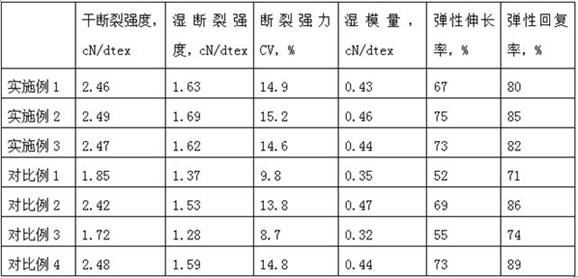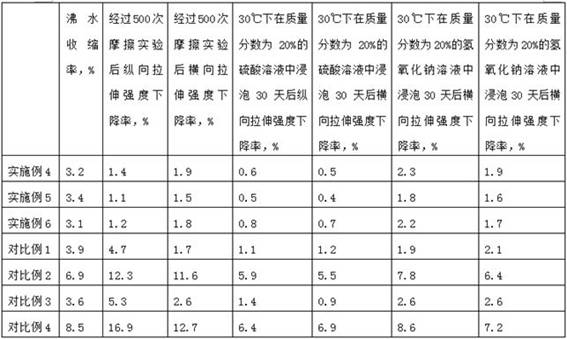Preparation method of cellulose mucilage glue and application of cellulose mucilage glue in cellulose casing
A technology of cellulose viscose and cellulose casing, applied in the field of viscose fiber, can solve the problems of poor elongation at break and dimensional stability, poor dimensional stability and wear resistance, poor elasticity and wear resistance, etc., and achieve water vapor High transmittance, high dimensional stability, and the effect of improving spinnability
- Summary
- Abstract
- Description
- Claims
- Application Information
AI Technical Summary
Problems solved by technology
Method used
Image
Examples
Embodiment 1
[0061] A preparation method of cellulose viscose, specifically:
[0062] 1. Prepare viscose solution:
[0063] (1) Soaking: Soak cotton pulp in lye, control the soaking temperature to 25°C, and soak for 2.5 hours to obtain soaked cotton pulp;
[0064] The degree of polymerization of the cotton pulp is 650, and the methylcellulose content is 95.5%.
[0065] The weight ratio of described cotton pulp and lye is 1:1.5;
[0066] The composition of the lye, in parts by weight, includes: 100 parts of deionized water, 20 parts of sodium hydroxide, 3 parts of potassium phosphate, and 2 parts of fatty alcohol polyoxyethylene ether sodium sulfate.
[0067] (2) Crushing: After the soaked cotton pulp is squeezed out of the lye by a press, it is sent to a pulverizer and pulverized to 100 meshes to obtain pressed cotton pulp;
[0068] (3) Aging: Aging treatment is carried out on the pressed cotton pulp, the aging treatment temperature is controlled at 15°C, and the aging treatment time is...
Embodiment 2
[0091] A preparation method of cellulose viscose, specifically:
[0092] 1. Prepare viscose solution:
[0093] (1) Soaking: Soak cotton pulp in lye, control the soaking temperature to 30°C, and soak for 2.7 hours to obtain soaked cotton pulp;
[0094] The degree of polymerization of the cotton pulp is 700, and the methylcellulose content is 96%.
[0095] The weight ratio of described cotton pulp and lye is 1:1.7;
[0096] The composition of the lye, in parts by weight, includes: 105 parts of deionized water, 22 parts of sodium hydroxide, 4 parts of potassium phosphate, and 3 parts of fatty alcohol polyoxyethylene ether sodium sulfate.
[0097] (2) Crushing: After the soaked cotton pulp is squeezed out of the lye by a press, it is sent to a pulverizer and pulverized to 110 meshes to obtain pressed cotton pulp;
[0098] (3) Aging: Aging treatment is carried out on the pressed cotton pulp, the aging treatment temperature is controlled at 17°C, and the aging treatment time is 2...
Embodiment 3
[0121] A preparation method of cellulose viscose, specifically:
[0122] 1. Prepare viscose solution:
[0123] (1) Soaking: Soak cotton pulp in lye, control the soaking temperature to 35°C, and soak for 3 hours to obtain soaked cotton pulp;
[0124] The degree of polymerization of the cotton pulp is 750, and the methylcellulose content is 97%.
[0125] The weight ratio of described cotton pulp and lye is 1:1.8;
[0126] The composition of the lye, in parts by weight, includes: 110 parts of deionized water, 25 parts of sodium hydroxide, 5 parts of potassium phosphate, and 5 parts of fatty alcohol polyoxyethylene ether sodium sulfate.
[0127] (2) Crushing: After the soaked cotton pulp is squeezed out of the lye by a press, it is sent to a pulverizer and pulverized to 120 mesh to obtain pressed cotton pulp;
[0128] (3) Aging: Aging treatment is carried out on the pressed cotton pulp, the aging treatment temperature is controlled at 20°C, and the aging treatment time is 24 ho...
PUM
| Property | Measurement | Unit |
|---|---|---|
| Particle size | aaaaa | aaaaa |
| Particle size | aaaaa | aaaaa |
| Particle size | aaaaa | aaaaa |
Abstract
Description
Claims
Application Information
 Login to View More
Login to View More - R&D
- Intellectual Property
- Life Sciences
- Materials
- Tech Scout
- Unparalleled Data Quality
- Higher Quality Content
- 60% Fewer Hallucinations
Browse by: Latest US Patents, China's latest patents, Technical Efficacy Thesaurus, Application Domain, Technology Topic, Popular Technical Reports.
© 2025 PatSnap. All rights reserved.Legal|Privacy policy|Modern Slavery Act Transparency Statement|Sitemap|About US| Contact US: help@patsnap.com



